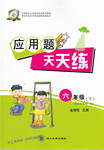题目内容
Some books are to be tasted, others to be swallowed, and some few to be _______(咀嚼)and digested.
 应用题天天练四川大学出版社系列答案
应用题天天练四川大学出版社系列答案Some people think that as more and more people have televisions in their homes, fewer and fewer people will buy books and newspapers. Why read an article in the newspaper, when the TV news can bring you the information in a few minutes and with pictures? Why read the life story of a famous man, when a short television program can tell you all that you want to know?
Television has not killed reading, however. Today, newspapers sell in very large numbers. And books of every kind are sold more than ever before. Books are still a cheap way to get information and enjoyment. Although some books with hard covers are expensive, many books are printed today as paperbooks (平装本), which are quite cheap. A paperback collection of short stories, for example, is always cheaper than an evening at the cinema or the theater, and you can keep a book for ever and read it many times.
Books are a wonderful provider of knowledge and pleasure and some types of books should be in every home. Every home should have a good dictionary. A good encyclopedia (百科全书), though expensive, is useful, too, because you can find information on any subject. Besides, you can have such books as history books, science textbook, cookbooks, and collections of stories and poems. Then from time to time you can take a book of poems off your shelves and read the thoughts and feelings of your favorite poets.
【小题1】It can be inferred from the passage that ________.
| A.TV programs are a chief provider of knowledge. |
| B.cinemas are the best choice in getting information. |
| C.reading is a cheap way of learning and having fun. |
| D.newspapers are an expensive way to enjoy oneself. |
| A.People only need reading, though. |
| B.Reading is still necessary today. |
| C.Reading is more fun than television. |
| D.Watching television doesn’t help reading. |
| A.Fewer and fewer people will buy books. |
| B.A good dictionary should be kept in every home. |
| C.Books with hard covers sell better than paperbooks. |
| D.More people like TV programs about famous men. |